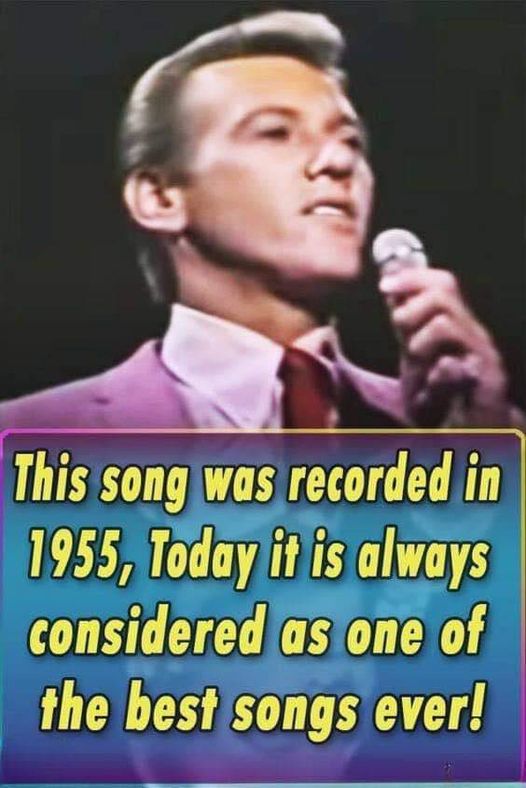In the mid-1950s, America was restless. The war was behind, the future seemed bright, but music was beginning to stretch its wings in directions no one had quite imagined. Into this world came a song that would not only slip past the ordinary expectations of the time but would live on for decades, wrapping itself around generations: Unchained Melody.
The first notes of this song were not intended to be immortal. They were crafted for a modest film called Unchained, released in 1955. The movie told the story of a prisoner torn between finishing his sentence or breaking out to reunite with the people he loved. It was not a box-office juggernaut. In fact, it quietly slipped into the catalog of mid-century cinema, remembered only by enthusiasts of the genre. Yet, what emerged from that film was something larger than the screen itself.
The lyricist Hy Zaret, working alongside composer Alex North, could not have predicted that their creation would escape the fate of so many movie songs—destined to fade when the credits rolled. Instead, the melody found a way of chaining itself to the human spirit. Its words, simple but aching, resonated with a truth older than cinema: the universal longing for love, and the fear of its loss.
When it was first recorded in 1955, Unchained Melody slipped into the airwaves like a whisper that refused to be ignored. The performance carried a haunting vulnerability, the kind that leaves the listener feeling both comforted and unsettled. Even in its earliest form, people knew this was not just another song; it was a confession, a plea, and a prayer bound into three minutes of music.
A decade later, the song would take on an entirely new life. In 1965, The Righteous Brothers, with their gospel-influenced voices and sweeping harmonies, decided to record their own version. It was no longer tied to a film or a prisoner’s choice; it had become something larger, almost cosmic. When Bobby Hatfield’s voice soared over the orchestration, it was as though every ounce of human yearning had been distilled into that sound.
Radio stations spun it relentlessly. Lovers played it in darkened rooms, parents hummed it to children, and the lonely found solace in its refrain. It was no longer just a song—it had become a cultural heartbeat. By the time the ’70s and ’80s arrived, Unchained Melody was already cemented as one of the most recorded songs of the 20th century. Everyone wanted to leave their mark on it, from pop stars to crooners to choirs. Yet somehow, no matter the interpretation, the song retained its essence: a mixture of fragile hope and enduring love.
But the story didn’t end there. Fate had another act in mind, one that would ensure Unchained Melody would never drift into nostalgia. In 1990, a romantic fantasy called Ghost paired the song with a scene that would etch itself into cinematic history. The film starred Patrick Swayze and Demi Moore, and while its story revolved around love that transcended death, the moment that audiences could not forget was far simpler: a woman at her pottery wheel, her hands wet with clay, and the ghostly presence of her beloved reaching to guide her.
As Unchained Melody played in the background, the ordinary became extraordinary. The song elevated the moment into something timeless. Viewers around the world felt their hearts pulled into that intimate space, where love was as tactile as clay and as eternal as the voice on the record. Suddenly, a song written for a forgotten prison film became the anthem of a generation who had never even heard of Unchained. Sales of The Righteous Brothers’ recording soared again, decades after its release. Radio stations dusted it off as though it had been waiting for the right moment to reappear.
By then, Unchained Melody had escaped every possible boundary. It belonged neither to 1955 nor to 1965, nor even to the cinema of 1990. It belonged to anyone who had ever felt the desperate pull of love, the kind that makes time irrelevant. The title itself became ironic—this melody was anything but chained. It roamed freely, attaching itself to weddings, farewells, reunions, and private moments of reflection.
Even music historians, who often debate endlessly about rankings and legacies, have largely agreed on its place among the greatest songs ever written. Its longevity is not simply about commercial success or the number of covers it has inspired—though both are remarkable. Its power lies in its ability to mean something personal to every listener. To one, it is the anthem of first love; to another, the memory of a parent long gone; to yet another, the song that makes silence feel less lonely.
Perhaps that is the secret: Unchained Melody was never just about a prisoner, or a pair of brothers with righteous voices, or even about pottery and ghosts. It was about the human condition itself—the fragile, unbreakable tether between love and time. Hy Zaret and Alex North may have written it for a script, but they unknowingly handed the world a key to its own collective heart.
And so, nearly seventy years later, the song continues to echo. New artists will keep recording it. Films will keep rediscovering it. Couples will keep choosing it for their wedding dances. And every time those opening notes drift into the air, listeners will feel that familiar tug, as if someone has just whispered directly to them: love is here, it has always been here, and it will never let you go.
Unchained Melody was written for a film. But it was destined to belong to forever.
